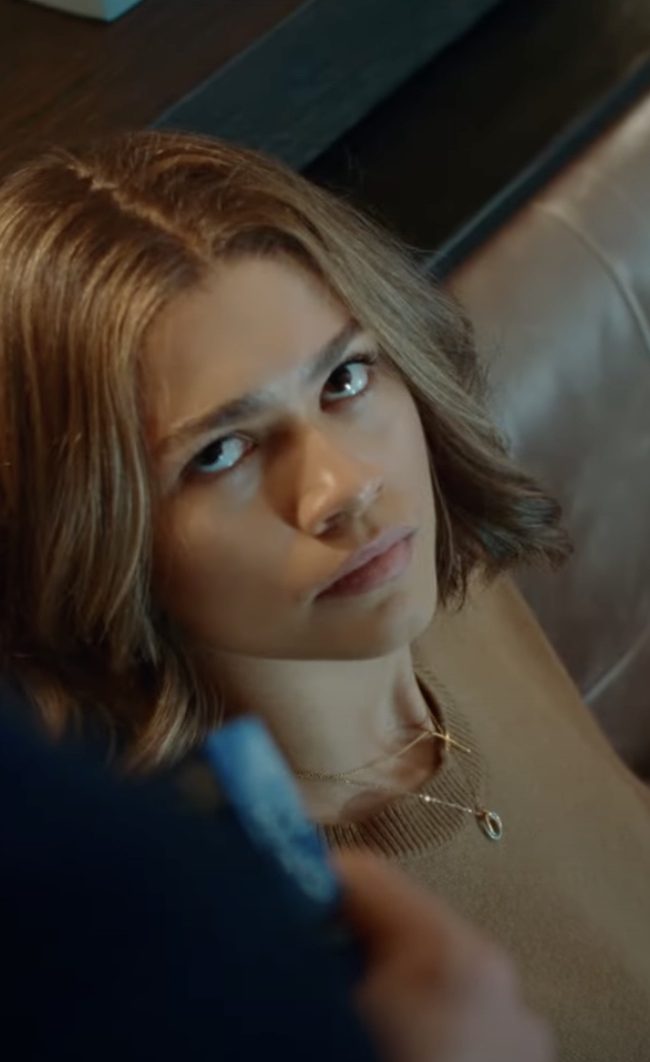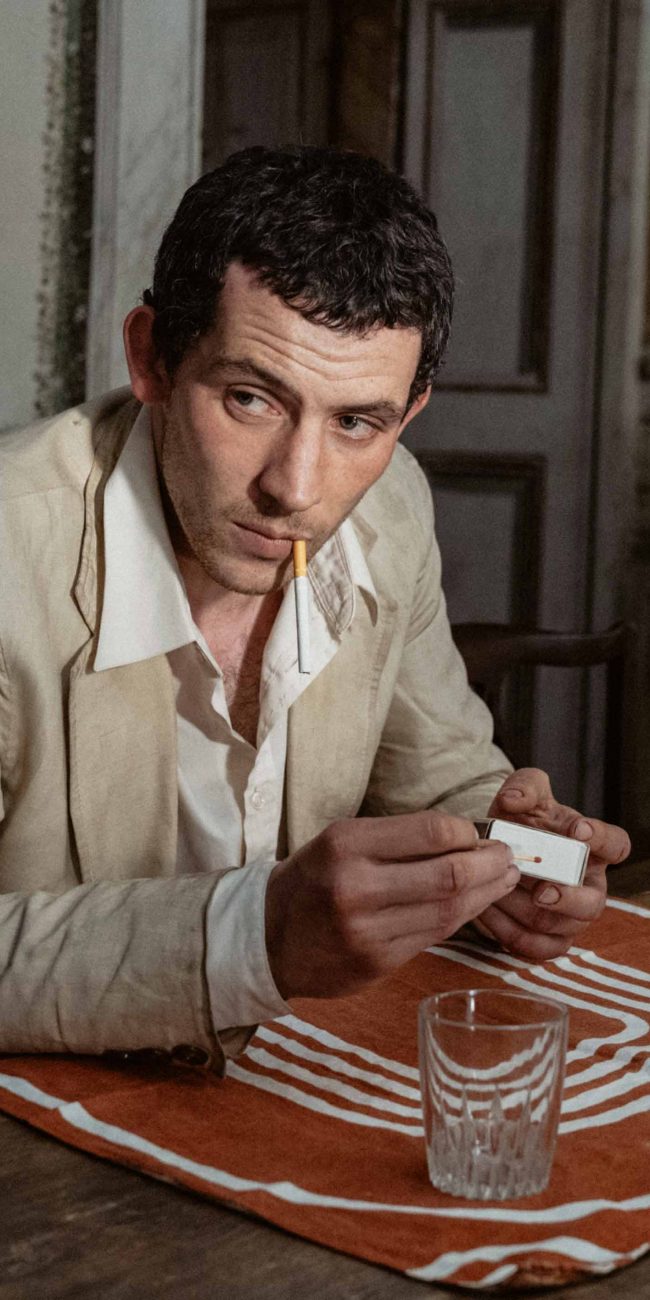A Conversation with Odessa Young & Eva Husson (MOTHERING SUNDAY)
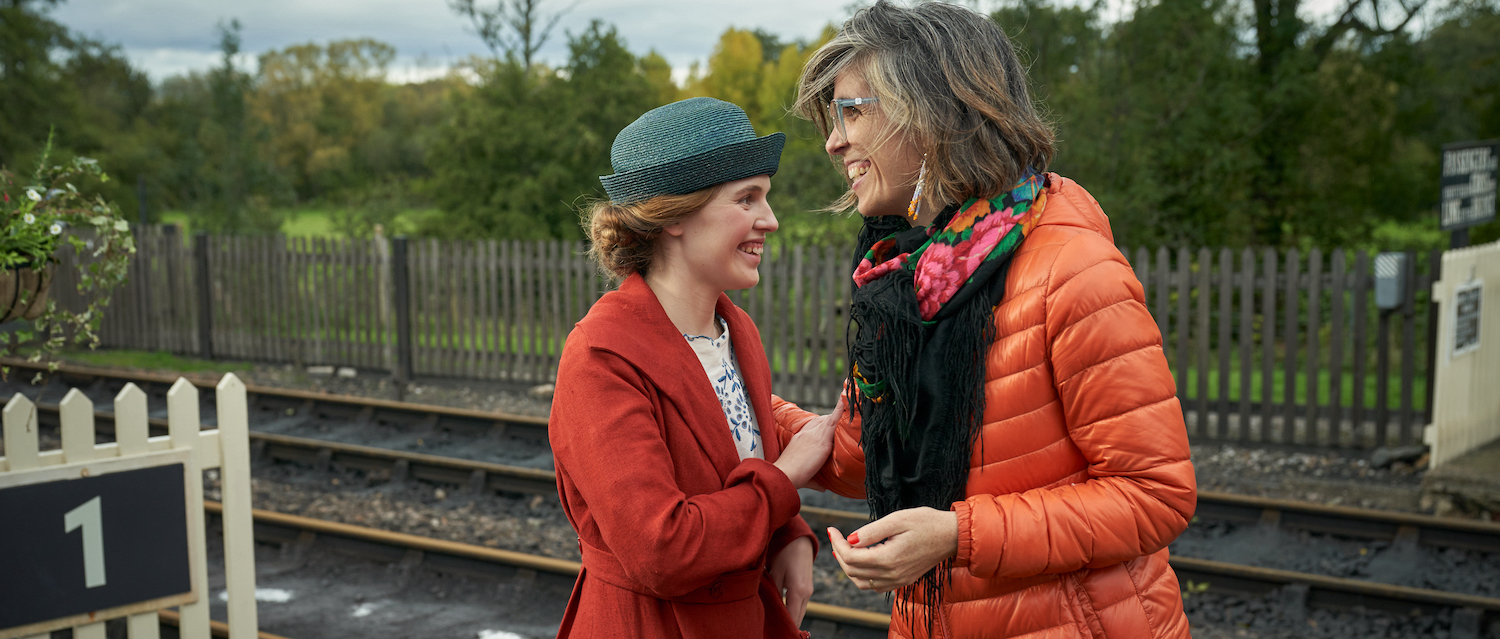
The film Mothering Sunday (which I reviewed out of the 2021 Toronto International Film Festival), an adaptation of Graham Swift’s eponymous 2016 novel, follows the journey of protagonist Jane Fairchild from housemaid to celebrated author over the course of the 20th century. Starting just after World War I, the story grounds itself in the upper-class despondency of that period, as empires crumble and survivors grapple with their grief over loved ones lost. We watch as Jane, played by actress Odessa Young (Assassination Nation), comes into her first sense of self, blossoming into a woman of agency and intellect. It’s a powerful narrative, beautifully photographed and evocatively edited. Just recently, ahead of the film’s general release on March 25, I spoke with Young and director Eva Husson (Girls of the Sun) by Zoom, each separately. What follows is a transcript of both conversations—starting with Husson—edited for length and clarity.
Hammer to Nail: So, you came to this project after reading Alice Birch’s script, which is an adaptation of Graham Swift’s book. I believe producer Elizabeth Karlsen sent it to you. What attracted you to the material?
Eva Husson: I guess I just connected with the emotional door that was opening. I was going through some personal stuff at the time and it just resonated with me, and I thought that if it resonated with me, it would probably resonate with other people. That’s how I try to approach these things, thinking of myself as a member of the audience.
HtN: Did you shoot the script as it was given to you or did you work with Alice Birch to make any additional changes?
EH: I made additional changes. There were some things I wanted to clarify and I thought the character of Donald needed a little more work. I kept on massaging the script and then in the editing room there was an additional rewriting phase.
HtN: But the narrative conceit, of a story told over multiple eras, which I don’t believe is in the source material, was that in the original script?
EH: Well, I haven’t re-read the book for a while, since I didn’t want it to taint my process, but as I remember it is mostly set in the 1990s, and I just really loved how Alice reframed the time fragmentation, because it’s very in line with how memory works and how you process things as a creator, and it just felt really close to home.
HtN: Indeed, I love your approach to time in the film, and the malleability of memory. You achieve a lot of that, in my opinion, through the elliptical way in which you structure the scenes. In the editing room, did you expand that sense of malleability once you were sitting with the material or did you always plan to have this elliptical approach to the story?
EH: It was definitely in the script, but we pushed it a little bit further with the editor because there were some things that weren’t working or were just too hyper-fragmented. In one version of the movie, for example, the watching of the film was not emotional at all, which freaked us out. But then I realized that we could re-arrange some scenes to charge the story more emotionally.
HtN: Especially early on, you work with a lot of close-ups and blurry distortion—shallow depth of field—on those close-ups, almost as if you are expressing the unreliability, or malleability, of memory. How did you arrive at this approach?
EH: Some of it was already scripted, and it just allowed me to have a really clear sense of Alice’s grammar, which is quite particular as a screenwriter to have this ability to be so visual. The reason why I went for it is I felt she was writing as I would write it. It felt like my world. And she even said to me when she watched the film that she was seeing her words as they were written, up on the screen. So we had this very fluid, creative process.
And as far as the unreliability of memory goes, I really enjoyed changing the color of the flowers in the bedroom from scene to scene, fragment to fragment. It’s not something that I insist upon, but if you watch the film a second, third, or fourth time, you will notice that. Sometimes the flowers are white, sometimes they’re blue, sometimes pink. You don’t necessarily realize it, but it’s part of the impression.
HtN: I like that, a lot. I’ll have to go back and watch it again in order to catch that. I also really like the way you contrast Odessa Young’s physical vitality with the upper-class despondency of the other characters. How did you cast her?
EH: I mean, that’s exactly why I cast her. I saw her in Shirley and I was impressed with her physicality. The female writers that I know have this lack of vulnerability and strength. Alice Birch, for example, she scares me. I don’t know if she’ll ever see this specific interview, but it’s funny, she’s just this very soft-spoken person but she has this incredible strength and it sort of radiates out of her. And that’s exactly what I wanted for Jane, and when I saw Odessa, I said, “That’s her.”
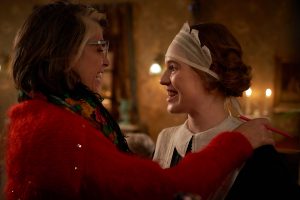
Eva Husson (Director) and Odessa Young on the set of MOTHERING SUNDAY. Photo by Robert Viglasky. Courtesy of Sony Pictures Classics.
HtN: So, I was reading about your own family history, which includes Spanish Republican soldiers who helped the French Resistance during World War II. Now, this film takes place at a time of post-war peace, but I wonder if any of that personal history affected your approach to the material.
EH: I guess it informs my relationship to political statements and how I can carry the torch, in a way. My grandfather was very committed but he did that at a time where if you were 16 and there was a war, you would just enroll. It’s not what happened to my generation, but I’m just trying to be very conscious of the movies I am making, politically. Even my first film, Bang Gang, which seems very light and hedonistic, deals with serious issues. My second film, Girls of the Sun, is about female fighters combatting ISIS, and this new one is about a character entrenched in gender, race, and social struggles, but in a very delicate way. So, yes, I guess these things are important to me.
HtN: Well, thanks for making the film and for chatting with me.
EH: Thank you!
Hammer to Nail: I already asked Eva Husson about this, but how did this script come to you and what appealed about it to you, specifically?
Odessa Young: I got sent it by my agent, who said it was pretty brilliant and that I should read it, and he was right. And I mainly connected with Jane in terms of the watchful quality that she has. At one point, Donald calls her an observer of life, and I feel a slightly alienating connection with that. Ultimately, that was the entry point. The script was good; I liked what Eva had done in previous movies; I felt like I could bring an interesting quality to the character. I felt like it would also be a challenge, so there really was no reason to say no. (laughs)
HtN: Well, there you go! So, you filmed the movie under COVID restrictions, incarnating a part that requires a fair amount of physical and emotional intimacy with at least two other actors, Josh O’Connor and Sope Dirisu. Did you find that shooting under these conditions helped or hurt the process of preparing for such intensity and intimacy?
OY: Honestly, I think we just adapted, to the point where I don’t think it’s a comparison between how it once was and how it is now. I mean, they’re all closed sets, anyway, so it wasn’t like we were missing people in the room. In those scenes, there are only so many people who are allowed to be in the room. We never felt in any danger of catching COVID from each other because we were all getting tested three times a week and we didn’t have any lives outside of work, which is just the nature of this business.
And just in terms of building a relationship with them before we started shooting, that’s a luxury you’re rarely given, anyway, in normal times. Josh and I had a couple of rehearsals, which allowed us to agree to leave it all out on the table. And he’s just a guy who’s down for anything and game and lovely and a brilliant actor. Sope, as well. He’s one of the most dedicated-to-his-character people I’ve met, and so we were just gifted with them and that made all the difference. That made everything click into place.
HtN: I find your performance quite remarkable in its simultaneous emotional restraint and enormous well of feeling just below the surface. How did you arrive at that combination?
OY: It’s so much harder to feign feeling than it is to feign unfeeling, and that was lucky for me because that was just the reality for Jane. Despite the fact that she felt everything she was not in a position to ever reveal that and why. So it’s not like I ever had to conjure it up out of nowhere. And for me, when I watch something, that is the most relatable activity, to see people as they try to hold everything together and failing. And I do think she fails. She’s not impenetrable. And in terms of working myself into those places, I black out every single time and hope that it happens. (laughs) I just give up trying and see what happens.
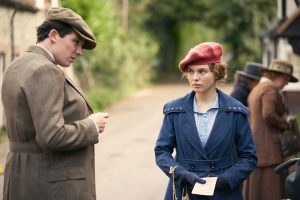
Odessa Young as Jane Fairchild, Josh O’Connor as Paul Sheringham in MOTHERING SUNDAY. Image by Jamie D. Ramsay (SASC). Courtesy of Sony Pictures Classics.
HtN: Well, whatever you did, it works. You also play this part with a physical vitality that is in sharp contrast to the listlessness and depression of the upper-class characters. Did you and Eva Husson discuss how to make sure that you had this really strong physical contrast?
OY: I think that’s just really the tone of the script. Alice Birch wrote these vignettes and these moments and these details, and the pace of her writing is so snappy and with almost a sort of ASMR quality to things. So I think it was probably just an internalization of the tone of how she wrote the script that brought out the vitality, and then Eva and I just ran with it. The script is kind of written in the way that Jane’s mind works, as an older woman looking back at this time of her life and choosing to remember the things that she does.
HtN: If I may ask a question about accents…Talking to you right now, I hear what sounds like a fairly neutral American accent, but you were raised in Australia, correct?
OY: Yes.
HtN: And here you’re playing a British working-class character. Where does your accent normally fall, and do you ever have difficulties remembering what your original voice was?
OY: Yeah, I haven’t sounded Australian in a long time. I’m a fraud! Simple as that. I’ve adopted accents willy-nilly and it is hard to break out of them. For the most part, I try to stay in accent when I’m working, and I’ve been working predominantly in the United States for the last five years, so that’s kind of the accent that’s come out. And now I go back to Australia and get made fun of a lot.
HtN: I’m sure! My mother is French and her French is tinged with American since she’s been living here for so long.
OY: Oh! Interesting. I bet the French love that! (laughs)
HtN: Indeed they do. (laughs) Speaking of your work in the United States, you’ve done a great variety of roles already in your young life. At this point in your career, I’m sure you have more choice in what you want to do. Do you try to make sure that the next project from the one you’ve just done is different—jumping from The Stand to something like this—or is that not how you work?
OY: It’s a bit of both, really. After Mothering Sunday, I was like, “Great! That’s the period drama/love story with the nudity and the intimacy. I don’t feel the need to replicate that.” Mainly, when it’s about what I want to do next it’s more about what I don’t want to do next. And then I don’t really have expectations. I’m just really excited when I like a script, when something good shows up and I have an idea and it sparks conversation. That’s why I do it, for the buzz. I’ve never planned anything. (laughs)
HtN: Well, thank you for the chat! I enjoyed it and enjoyed the film!
OY: Thanks, Chris!
– Christopher Llewellyn Reed (@ChrisReedFilm)
2021 Toronto Film Festival; Eva Husson; Odessa Young; Mothering Sunday movie








